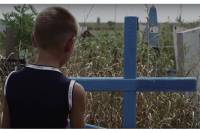FNE at 6th CineDOC Tbilisi IDFF: Simon Lereng Wilmont's War Film Wins CineDOC Top Prize
Georgia 10-05-2018TBILISI: Simon Lereng Wilmont's film The Distant Barking of Dogs won the main award of the international competition of the 6th edition of CinéDOC-Tbilisi, the first international documentary film festival in the Caucasus, which concluded on 8 May 2018.
TBILISI: Three Georgian debut feature films received 340,00 EUR in grants from the Georgian National Film Center (GNFC). Twenty projects participated in the competition.
TBILISI: The Georgian National Film Center has announced development grants for 12 feature film projects.
TBILISI: Georgian National Film Center distributed 360,925 EUR / 1.1 m GEL for the production of three international coproductions directed by Levan Tutberidze, Tinatin Kajrishvili and Stefan Tolz.
TBILISI: Georgia had a great year with more awards at international festivals and more attention given to Georgian films. Georgian cinema days were held in London, Kiev and Peru, and Georgia was a Focus Country at the 2017 International Leipzig Festival for Documentary and Animated Film.
TBILISI: Domestic films admissions increased by 86.97 percent, while box office of domestic films increased by 77.25 percent in 2017. This is due to the release of more Georgian films including successes such as Hostages, My Happy Family and The Confessions.
TBILISI: Writer/director/producer Rati Tsiteladze is in the advanced development stage with The Empty House, an international coproduction set for shooting at the end of 2018. The project was selected for the 2018 Talent Project Market, a collaboration between the Berlinale Co-Production Market and Berlinale Talents.
FNE spoke with Zurab Maghalashvili, the director of the Georgian National Film Center, about the changes in the Georgian cinema since his appointment in spring 2016 and what lies ahead.
TBILISI: The Georgian National Film Center distributed 157,812 EUR / 505,000 GEL for the production of 14 short fiction films. A total of 46 projects have been submitted.
Before directing his debut feature, Hungarian filmmaker Peter Politzer gained considerable experience as a film editor. That is why it is not surprising that, in Manhood, the director's main storytelling instrument is montage. He tells us a tale of three generations of people living in Budapest. If D.W. Griffith, in his 1916 movie Intolerance, employed parallel editing to emphasize thematic similarities across different epochs, here Politzer articulates the continuity of phenomena.
Manhood follows three men at various stages of their life in Budapest. Samu (Samu Fischer) is a 13-year-old football fan who dreams of becoming a successful athlete. Deszo (Martin Szipal) is a 91-year-old man whose life is associated with photography and love stories. Forty-year-old bassist Frank (Peter Vass) has a life full of difficulties. Politzer visualizes these lives with a geometric and sculptural visual accuracy. When Deszo speaks in voiceover, while we observe his activities , the impression is that he has been deprived of the right to speak.
The director dramatizes this scenario with black-and-white imagery, although the film seems more gray than black-and-white. This is partly a reflection on our routine and hopeless life. A soundtrack of jazz compositions partly neutralizes this tension, as does humor, which adds comedy.
We can ask a question: what is the ideological or political base of Manhood? The answer is difficult, because the director does not make the meaning or message of his stories clear. The story is not complex. The cinematographer's camera is watching the events and observing heroes from a spiritual perspective. However, it is important to have a deep study of the background where they have to exist. Their "idea of success" is elusive, because the high class determines it.
In this case, Politzer's cinematic language is only descriptive and he just fixes the lives of heroes. Sometimes such narrative techniques are justified, and the film becomes interesting from many perspectives. But in this case, this solution is ineffective. The emotional and intellectual self-reflection on this film becomes difficult for the audience. There is no key episode (a direct and radical scene) in which we see that the protagonists have more or less identical problems; This is the reason for the film’s lack of catharsis.




























